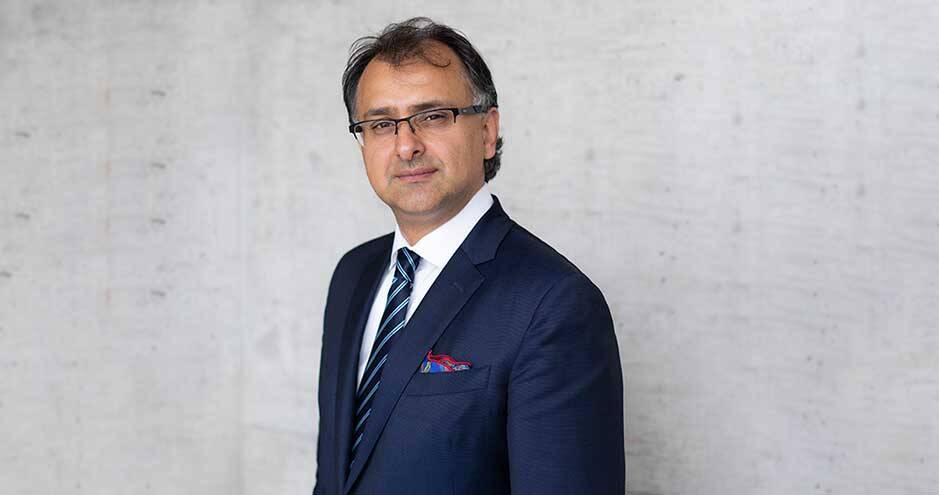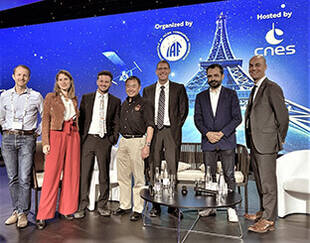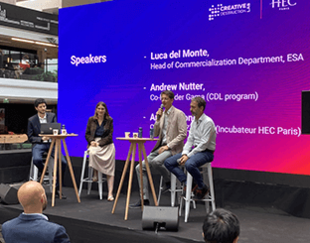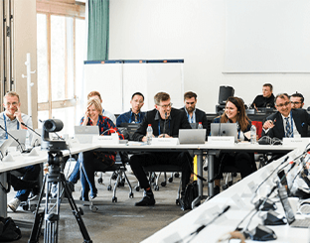Groundbreaking CDL Space Stream Leverages New Ecosystems in Paris
Creative Destruction Lab was founded a decade ago by Professor Ajay Agrawal as part of University of Toronto’s Rotman School of Management. It has since expanded to a dozen business schools, all devoted to a seed-stage program for massively scalable, science- and technology-based companies. Professor Agrawal was on hand throughout the two-day CDL Space Stream sessions in Paris in February. He orchestrated the exchanges with 24 startup companies, all vying for financial and technical backing to establish themselves in the space sector. We caught up with the co-author of “Power and Prediction: the Disruptive Economics of AI” during a short break at Station F.

This is the inaugural year for a global CDL Space stream (a partnership between HEC Paris, Georgia Tech, and University of Toronto). How has it progressed since it started in October?
When we started CDL Space in 2018 at the Rotman School of Management, I think we may have been the first in the world to have designed a program focused exclusively on startup ventures for space. The economic logic behind this is the significant drop in cost of delivering assets to low Earth orbit in the past ten years - and it's about to drop again by another 30 to 50 times! Indeed, when [businessman Elon Musk’s] SpaceX turns on the commercial capacity of Starship, it will reduce the cost of delivering assets to low Earth orbit to somewhere between $30-50 per kilogram. This means that many things that were not economically feasible five years ago will now be viable. So what you're seeing today in CDL Space is the positioning of many companies who are building in anticipation of this new world, that's coming very soon. There are very few times in in our human history where accessing something suddenly becomes 30 times cheaper overnight. So it's very exciting. And for CDL to partner HEC as part of the global stream, one of the world's top business schools, at a time when we have much lower cost access to space, well, it’s really a worthwhile project to build on. Here, we have some of the most creative minds thinking about the things that society will most benefit from in space’s ecosystem.
How do you explain this huge drop in costs?
Well, it's down to technological innovation which brings with it an increase in productivity. SpaceX and some other companies seem to be ahead of everyone else in this field.
There are about a dozen MBA students from HEC involved in accompanying and advising the companies in their project. How would you gauge their impact and input so far?
The MBA students are making a great contribution to these companies. Remember, many of the startup founders in this program are scientists, with a technical background. Sure, it’s very important to have a solid technical basis for what they're building. But, at the same time, they have to finance their work, and that's where the MBA students come in with three primary objectives. One is communication: how do you take this highly technical work and communicate its impact in a way that a broad base of investors will understand? It sounds easy, but it isn’t and the MBA students have considerable training and experience in articulating the essential assets of the startup. The second area where the MBA students help is in evaluating the market opportunity: understanding the customer base and clarifying the value proposition that customers will receive from using the products and services of these companies. Finally, their third task is performing a market analysis, including benchmarks on the competition. How should these startups position themselves in order to differentiate themselves from their rivals and best serve their customers? These are aspects that do not come naturally to scientist founders. The MBA students have been very well trained in understanding markets, so they take this knowledge of market structures and apply it to space.
This session also marks the announcement that Oxford Saïd Business School is joining the three other institutions next fall in the Space Stream. How important is that to the program?
I think it’s a very exciting development. Saïd is also one of the top business schools in the world and they attract a wonderful group of highly accomplished mentors. The school has already been quite active in doing research and coordination work for space technologies. They see space as a future strategic area to play a role in. On top of this, they are situated near the Harwell campus, with its community of research experts and space-related companies. So CDL Space has another local ecosystem to leverage. In North America, we have Georgia Tech, which is one of the top five universities closely linked to NASA (alongside MIT, Caltech and University of Toronto). So there’s Georgia Tech and Toronto’s Rotman School in North America. And Oxford and HEC in Europe. It gives us a strong balance in a very competitive market where there's competing structures in terms of East-West rivalry. In some sense, space is the frontier where this competition is crystallizing. So, by federating these four remarkable schools we are tilting the balance in our favor, an important factor in our development.
Final question, Ajay. CDL at Rotman blew out its 10th birthday candle last year. When you dreamt up the program a decade ago, could you imagine that you'd be here today?
No, we certainly had no idea, and it's wonderful to be here in Paris. About three years in, we had the support of a very generous and forward thinking benefactor at my school named Joseph Rotman who's now passed away. Joe very much liked our approach and encouraged us. But he advised us to share our work beyond the school. At that time, I thought why would we want to do that? Isn't this a good foundation for competing with other business schools? And he said: ‘I've learned through my life that if you've got a very good idea, it's much better to share it.’ At the time I thought that was being naive, that we were giving away something valuable. Since then, I’ve realized how right Joe was. Being here today in Paris, for example, collaborating and interacting with the HEC students, seeing all the interest shown by the European companies and mentors – well, that would never have happened if this were still a small program at one business school. Our mission is to enhance the commercialization of science for the betterment of humankind. And we can do much better, much more effective work towards that mission by fostering this type of network.



